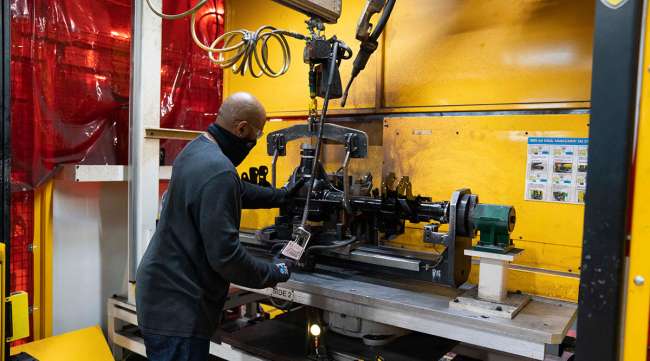A worker prepares an axle for welding at the Dana Inc. Toledo Driveline Facility in Toledo, Ohio. (Dane Rhys/Bloomberg)
President Donald Trump is on track to ease the impact of his auto tariffs, with changes sought by the industry that would lift some levies on foreign parts for cars and trucks made inside the U.S.
Imported automobiles also would be given a reprieve from separate tariffs on aluminum and steel, an effort to prevent multiple levies from stacking on top of each other, a White House official said April 28.
“This deal is a major victory for the president’s trade policy by rewarding companies who manufacture domestically while providing runway to manufacturers who have expressed their commitment to invest in America and expand their domestic manufacturing,” Commerce Secretary Howard Lutnick said in an emailed statement.

Lutnick
The expected shift, reported earlier by The Wall Street Journal, comes as Trump prepares to travel to Michigan, the heart of the American automobile industry, to mark the first 100 days of his second term in the White House.
A proclamation setting the changes in motion could be signed as soon as April 29, the official said, before Trump’s planned speech in Macomb County, a carmaking hub and bastion of blue-collar workers Trump says his tariff are meant to help.
The pivot also would represent the latest evolution in Trump’s ever-changing trade strategy, following his decision earlier this month to pause higher tariffs on dozens of trading partners to allow time for negotiations.

Trump
The expected changes come just before the 25% tariffs on foreign auto parts are set to take effect May 3. Under the planned changes, automakers would be able to secure a partial reimbursement for tariffs on imported auto parts, based on the value of their U.S. car production, according to the official.
The extent of those reimbursements would decline over time — with a phaseout meant to prod automakers to shift more of their supply chain into the U.S. while also giving them time to adapt.
In a separate move, Trump is poised to ensure imported autos aren’t double-tariffed by also paying other levies on steel and aluminum.
Automakers, dealers and parts suppliers had pleaded for some relief, warning that Trump’s tariffs risked upsetting a tightly knit North American supply chain.
“Ford welcomes and appreciates these decisions by President Trump, which will help mitigate the impact of tariffs on automakers, suppliers and consumers. We will continue to work closely with the administration in support of the president’s vision for a healthy and growing auto industry in America,” Ford Motor Co. CEO Jim Farley said in a statement.
Mary Barra, the CEO of General Motors Co., said in a statement that “we believe the president’s leadership is helping level the playing field for companies like GM and allowing us to invest even more in the U.S. economy.”
Industry groups said in a letter to the administration last week that duties on imported auto parts could raise costs for U.S. manufacturing facilities, jeopardizing efforts to revitalize domestic carmaking.
Trump earlier this month signaled he was sympathetic to auto companies’ concerns, telling reporters that carmakers using parts from Canada, Mexico and other countries “need a little bit of time because they’re going to make them here.”






